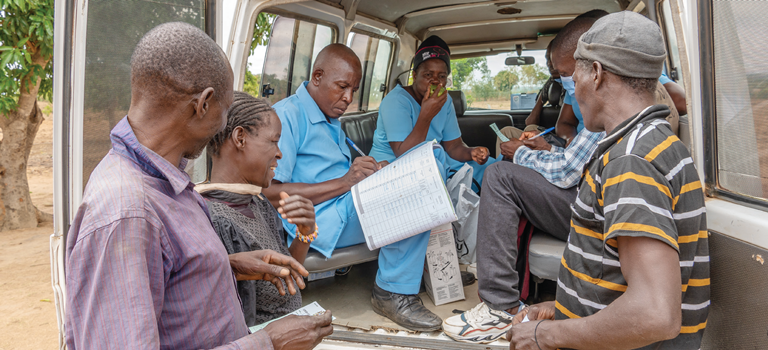Border community adopts Covid jab
The global spread of Covid-19 illustrates how contagious infections can cross borders at the speed people and goods move.
The pandemic has left Malawians in Kapombeza, Traditional Authority Ndamera in Nsanje District, alert.

The rural Malawians at the southern tip of Malawi are leaving nothing to chance because the porous border with Mozambique increases the risk of disease outbreaks.
In September, village heads Kiswell and Charles Kapombeza publicly received Covid-19 vaccines to assure their communities in the border strip that the jab is safe.
Kiswell explains: “The vaccines have become a trusted tool in the fight against the disease that has killed over 2 000 Malawians.
“To set an example, the two of us got vaccinated in public when community health workers brought the vaccines to the village. Then our wives took their turn. Afterwards, many villagers received the jab too.”
The local leaders have overcome widespread myths and misconceptions that the vaccinated would die or become barren.
“Total lies!” says Kiswell, aged 30. “Here I’m, still alive and my wife is five-month pregnant. Yet each of us has received two doses of AstraZeneca,” he explains.
The couple is among nearly 1.1 million fully vaccinated people in Malawi.
He thanks health workers for putting Covid-19 vaccines close to those who need them in his village of 120. Over half of adults in Kapombeza Village have been vaccinated.
“I don’t want my village to become a hotspot for diseases preventable through a simple vaccine. I want people to spend more time farming and doing business,” he explains.
The vaccinated include children such as Petro Anderson, 13, who desires to become a teacher and ensure every child learns.
The Standard Four boy at Nkhande Primary School received the first dose of Pfizer vaccine to protect his health, dream and family.
“I don’t want to fall sick or die when I catch Covid. I want to achieve my dreams and make mom happy,” he says.
The boy is not happy that her mother stops working and spends a lot of time nursing him when he is taken ill.
This month, his village benefitted from the Celebration of Covid-19 Vaccination Week themed “Reaching to Unreached”.
During the outreach, community health workers were receiving a K6 000 lunch allowance to take the vaccine to remote populations like Petro’s. The initiative helped utilise the 277 000 AstraZeneca vaccine doses expected to expire in May 2022.
Dr Ghashyam Sethy, Unicef health specialist, says: “Due to the remote settlement of the community, we modified our strategy and decided to knock on every door with potent vaccines in remote locations.
“About 280 000 persons received Covid-19 immunisation within a week of the strategy’s implementation.”
Last year, it helped utilise about 750 000 vaccine doses expected to perish in November and December.
Then United Nations provided vans, allowances and fuel for motorcycles and boats for teams deployed to bring vaccines closer to places where people live, work and meet.
Gracious Nkhoma, a health surveillance assistant from Nkhande Health Post in Nsanje, thanks the community leaders for leading by example.
He says apart from taking the jab transparently, their support was pivotal in the house-to-house campaign in which he vaccinated 87 people in the second week of April.
“The village heads informed their communities about the vaccination dates days before I went door to door, vaccinating interested people aged at least 12. This helped the villagers accept the vaccines despite a worrisome wave of myths and misconceptions,” he recalls.
Kiswell, enthroned village head Kapombeza in 2016, says he uses every opportunity, especially public gatherings, to rally everyone in his community to get vaccinated when health workers arrive.
Kiswell reckons his village is on course to become “the land of the fully vaccinated”.
He states: “We will not relent until everyone is vaccinated because we are too close to our porous borders. We are constantly in touch with Mozambicans across the border.
“We have intermarried and most of them are our relatives, so protecting ourselves is protecting our community, our extended families and our neighbours. We get most of the basic goods from the other side and we will no longer be in trouble if security agents ask for proof of vaccination.”





One Comment